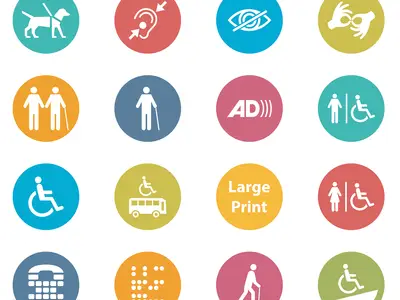Data-driven research and program evaluation to improve the quality of supports and services for people with disabilities
The number of people with disabilities in the United States is large and growing. In 2021, more than 44 million Americans had a disability. As the population ages, the number of older adults who will develop disabilities will increase. In 2021, 24% of people aged 65 to 74 and 46% of people aged 75 or older had a disability, defined as reporting difficulty with hearing, vision, cognition, ambulation, self-care, or independent living.
Evidence also points to increases in life expectancy for people with an early onset disability, such as those with Down syndrome, other intellectual and developmental disabilities (I/DD), congenital heart defects, or early life spinal cord injuries. In 2021, more than 6% of people younger than age 35 reported having a disability. However, this percentage may be an undercount due to the lack of a national surveillance system to collect data on people with an I/DD in the United States.
Understanding the multifaceted needs of the growing population of people with disabilities at all ages is critical for policymakers, providers, and other stakeholders to ensure that those with disabilities receive appropriate and adequate supports and services, such as medical care, long-term services and supports (LTSS), and accommodations in the workplace.
RTI’s Data-Driven Disability Research & Expertise
RTI International’s experts offer a breadth and depth of subject matter expertise in the broad range of issues impacting the lives of Americans with disabilities, including the following:
- Intersection of aging and disability
- Integration of primary, acute, behavioral health, and LTSS
- Implementation of person-centered LTSS
- Quality of home and community-based services (HCBS)
- Person-centered quality of life measure development
- Access to health insurance, barriers to health care, and health care service use and costs
- Training, compensation, and support for direct care workers
- Identification of individuals with I/DD in health care claims data and I/DD dataset development
- Analysis of Medicaid claims data to understand the types and amounts of LTSS provided
Our clients reflect a broad range of federal government agencies, including the Administration for Community Living (ACL), Office of the Assistant Secretary for Planning and Evaluation (ASPE), Centers for Medicare & Medicaid Services (CMS), and Centers for Disease Control and Prevention (CDC).

ACL Rapid-Cycle Research and Evaluation
RTI supports ACL with rapid-cycle research and evaluation of aging and disability programs, ensuring that older adults and people with disabilities are served effectively. RTI has conducted more than 25 unique aging and disability projects, in a broad range of topics including the intersection of aging and disability, respite, Alzheimer’s disease and related dementias, quality of life, technical assistance, and Older Americans Act supports and services.

ACL HCBS Outcomes Research and Measurement
RTI and the Shirley Ryan AbilityLab (SRALab) are partnering to support the National Institute on Disability, Independent Living, and Rehabilitation Research in developing and testing new measures of non-medical, person-centered HCBS outcomes. RTI is also working with SRALab to support the use and application of these measures, including working closely with two advisory councils: one comprising individuals with disabilities who receive or are advocates for those who receive HCBS, and another with individuals who have expertise in HCBS-related policy development or service provision.

ASPE Analyses of Behavioral Health, Disability, and Aging Policy and Data
RTI has supported ASPE’s Office of Behavioral Health, Disability, and Aging Policy since 2016 with nearly 100 projects that focus on issues impacting Americans with disabilities. Our projects have addressed a broad range of subject areas, including the following:
- Dementia
- COVID-19 impacts
- Insurance coverage
- Institutional and community-based LTSS
- Mental health parity
- Substance use disorders
- Direct care workforce

ASPE Integrated Dataset on Intellectual and Developmental Disabilities
ASPE’s Office of Behavioral Health, Disability, and Aging Policy is partnering with RTI to develop a publicly available, de-identified, linked dataset to build data capacity for person-centered outcomes research relevant to the population with I/DD. This project aims to create a multistate integrated dataset linking the Supports Intensity Scale, Medicaid claims, National Core Indicators In-Person Survey, and other state data.
The linked dataset will enable researchers to analyze relationships among various sociodemographic factors, the need for HCBS, service utilization and expenditures, and person-centered outcomes before and during the COVID-19 pandemic for individuals with I/DD.

CMS Evaluation of State Demonstrations Under the Financial Alignment Initiative
RTI conducted a mixed methods study for CMS to monitor demonstration implementation and evaluate the impact of two types of integrated care delivery models under the Financial Alignment Initiative on beneficiaries’ experiences, health care quality, service use, and costs.
Related Projects
Using NPALS Data to Understand the Spectrum of Long-Term Care Needs in the U.S.
Read More about Using NPALS Data to Understand the Spectrum of Long-Term Care Needs in the U.S.
























